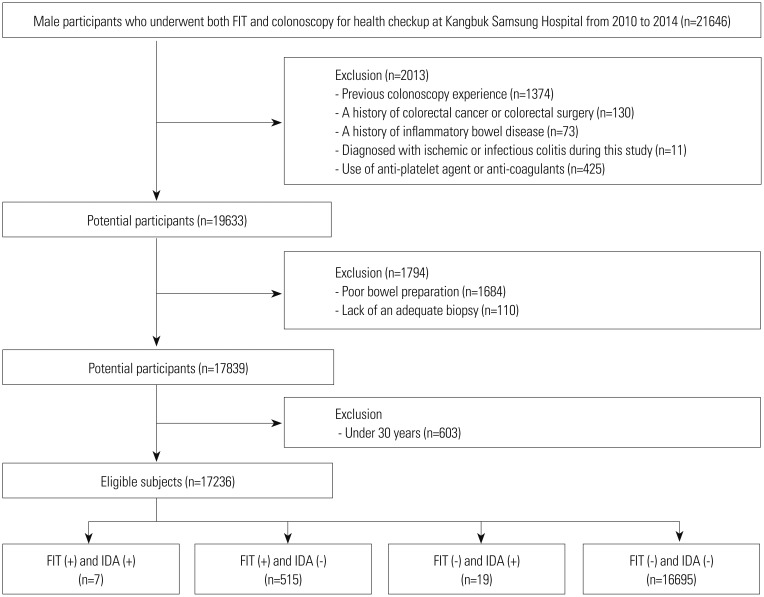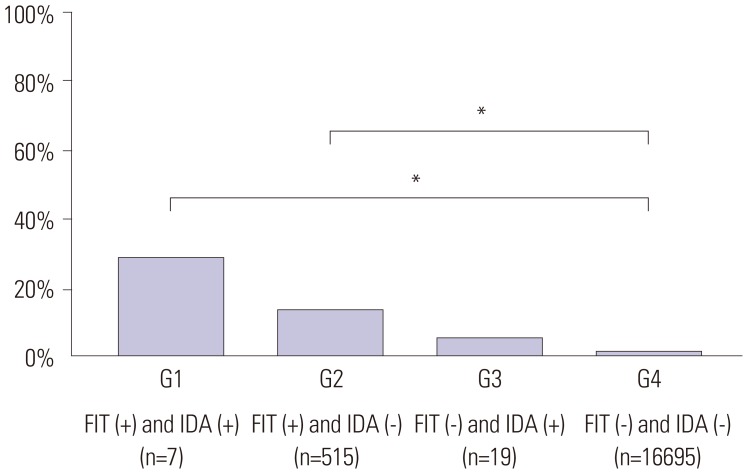Yonsei Med J.
2017 Sep;58(5):910-917. 10.3349/ymj.2017.58.5.910.
A Combination of Fecal Immunochemical Test Results and Iron Deficiency Anemia for Detection of Advanced Colorectal Neoplasia in Asymptomatic Men
- Affiliations
-
- 1Preventive Healthcare Center, Kangbuk Samsung Hospital, Sungkyunkwan University School of Medicine, Seoul, Korea.
- 2Division of Biostatistics, Department of R&D Management, Kangbuk Samsung Hospital, Seoul, Korea.
- 3Division of Gastroenterology, Department of Internal Medicine, Kangbuk Samsung Hospital, Sungkyunkwan University School of Medicine, Seoul, Korea. ys810.jung@samsung.com
- KMID: 2418925
- DOI: http://doi.org/10.3349/ymj.2017.58.5.910
Abstract
- PURPOSE
A substantial proportion of patients with colorectal cancer (CRC) present with iron deficiency anemia (IDA), and fecal immunochemical test (FIT) has proven to be an effective method for detecting the majority of CRC cases. A combination strategy of FIT results and IDA may be useful for risk stratification for detecting advanced colorectal neoplasia (ACRN). We compared the prevalence of ACRN among four groups stratified by FIT results and the presence of IDA.
MATERIALS AND METHODS
A cross-sectional study was performed on asymptomatic male participants who underwent both FIT and colonoscopy between 2010 and 2014 as part of a comprehensive health screening program in Korea.
RESULTS
Of 17236 participants, 522 (3.0%) showed positive FIT results and 26 (0.2%) had IDA. The mean age of the study participants was 40.8 years. The participants were classified into four groups: positive FIT result/IDA (G1, n=7), positive FIT result/no IDA (G2, n=515), negative FIT result/IDA (G3, n=19), and negative FIT result/no IDA (G4, n=16695). The prevalences of ACRN in G1, G2, G3, and G4 were 28.6, 13.4, 5.3, and 1.5%, respectively (p<0.001) and those of CRC were 28.6, 1.6, 0.0, and 0.01%, respectively (p<0.001). Subjects with positive FIT results and IDA had an increased risk of ACRN and CRC in both group aged <50 and ≥50 years.
CONCLUSION
Subjects with positive FIT results and IDA had an increased risk of ACRN. Our results suggest that a combination strategy of FIT and IDA may be helpful in selecting and prioritizing asymptomatic men for colonoscopy.
MeSH Terms
Figure
Reference
-
1. Guralnik JM, Eisenstaedt RS, Ferrucci L, Klein HG, Woodman RC. Prevalence of anemia in persons 65 years and older in the United States: evidence for a high rate of unexplained anemia. Blood. 2004; 104:2263–2268. PMID: 15238427.
Article2. World Health Organization. Iron Deficiency Anaemia Assessment, Prevention and Control: A guide for programme managers. Geneva: World Health Organization;2001.3. McIntyre AS, Long RG. Prospective survey of investigations in outpatients referred with iron deficiency anaemia. Gut. 1993; 34:1102–1107. PMID: 8174963.
Article4. Looker AC, Dallman PR, Carroll MD, Gunter EW, Johnson CL. Prevalence of iron deficiency in the United States. JAMA. 1997; 277:973–976. PMID: 9091669.
Article5. Andrews NC. Disorders of iron metabolism. N Engl J Med. 1999; 341:1986–1995. PMID: 10607817.
Article6. Rockey DC. Occult gastrointestinal bleeding. N Engl J Med. 1999; 341:38–46. PMID: 10387941.
Article7. Goddard AF, James MW, McIntyre AS, Scott BB. British Society of Gastroenterology. Guidelines for the management of iron deficiency anaemia. Gut. 2011; 60:1309–1316. PMID: 21561874.
Article8. Lindsay JO, Robinson SD, Jackson JE, Walters JR. The investigation of iron deficiency anemia--a hospital based audit. Hepatogastroenterology. 1999; 46:2887–2890. PMID: 10576367.9. Harris GJ, Simson JN. Causes of late diagnosis in cases of colorectal cancer seen in a district general hospital over a 2-year period. Ann R Coll Surg Engl. 1998; 80:246–248. PMID: 9771221.10. Goodman D, Irvin TT. Delay in the diagnosis and prognosis of carcinoma of the right colon. Br J Surg. 1993; 80:1327–1329. PMID: 8242314.
Article11. Cook IJ, Pavli P, Riley JW, Goulston KJ, Dent OF. Gastrointestinal investigation of iron deficiency anaemia. Br Med J (Clin Res Ed). 1986; 292:1380–1382.
Article12. Rockey DC, Auslander A, Greenberg PD. Detection of upper gastrointestinal blood with fecal occult blood tests. Am J Gastroenterol. 1999; 94:344–350. PMID: 10022627.
Article13. Kim NH, Park JH, Park DI, Sohn CI, Choi K, Jung YS. Are hemorrhoids associated with false-positive immunochemical test results? Yonsei Med J. 2017; 58:150–157. PMID: 27873508.14. Levin B, Lieberman DA, McFarland B, Andrews KS, Brooks D, Bond J, et al. Screening and surveillance for the early detection of colorectal cancer and adenomatous polyps, 2008: a joint guideline from the American Cancer Society, the US Multi-Society Task Force on Colorectal Cancer, and the American College of Radiology. Gastroenterology. 2008; 134:1570–1595. PMID: 18384785.
Article15. Young GP, Symonds EL, Allison JE, Cole SR, Fraser CG, Halloran SP, et al. Advances in fecal Oocult blood tests: the FIT revolution. Dig Dis Sci. 2015; 60:609–622. PMID: 25492500.16. Carroll MR, Seaman HE, Halloran SP. Tests and investigations for colorectal cancer screening. Clin Biochem. 2014; 47:921–939. PMID: 24769265.
Article17. Nakama H, Zhang B, Fattah AS, Zhang X. Colorectal cancer in iron deficiency anemia with a positive result on immunochemical fecal occult blood. Int J Colorectal Dis. 2000; 15:271–274. PMID: 11151429.18. Cilona A, Zullo A, Hassan C, Ridola L, Annese M. Is faecal-immunochemical test useful in patients with iron deficiency anaemia and without overt bleeding? Dig Liver Dis. 2011; 43:1022–1024. PMID: 21900058.
Article19. Soweid AM, Kobeissy AA, Jamali FR, El-Tarchichi M, Skoury A, Abdul-Baki H, et al. A randomized single-blind trial of standard diet versus fiber-free diet with polyethylene glycol electrolyte solution for colonoscopy preparation. Endoscopy. 2010; 42:633–638. PMID: 20623443.
Article20. Wen CP, David Cheng TY, Tsai SP, Chan HT, Hsu HL, Hsu CC, et al. Are Asians at greater mortality risks for being overweight than Caucasians? Redefining obesity for Asians. Public Health Nutr. 2009; 12:497–506. PMID: 18547457.
Article21. Camaschella C. Iron-deficiency anemia. N Engl J Med. 2015; 372:1832–1843. PMID: 25946282.
Article22. Fraser CG, Allison JE, Halloran SP, Young GP. Expert Working Group on Fecal Immunochemical Tests for Hemoglobin, Colorectal Cancer Screening Committee, World Endoscopy Organization. A proposal to standardize reporting units for fecal immunochemical tests for hemoglobin. J Natl Cancer Inst. 2012; 104:810–814. PMID: 22472305.
Article23. Lieberman DA, Rex DK, Winawer SJ, Giardiello FM, Johnson DA, Levin TR; United States Multi-Society Task Force on Colorectal Cancer. Guidelines for colonoscopy surveillance after screening and polypectomy: a consensus update by the US Multi-Society Task Force on Colorectal Cancer. Gastroenterology. 2012; 143:844–857. PMID: 22763141.
Article24. Kwah J, Schroy PC 3rd, Jacobson BC, Calderwood AH. Whites and blacks have similar risk of metachronous advanced colorectal neoplasia. Dig Dis Sci. 2014; 59:2264–2271. PMID: 24700155.
Article25. Short MW, Domagalski JE. Iron deficiency anemia: evaluation and management. Am Fam Physician. 2013; 87:98–104. PMID: 23317073.26. Johnson-Wimbley TD, Graham DY. Diagnosis and management of iron deficiency anemia in the 21st century. Therap Adv Gastroenterol. 2011; 4:177–184.
Article27. Young CJ, Sweeney JL, Hunter A. Implications of delayed diagnosis in colorectal cancer. Aust N Z J Surg. 2000; 70:635–638. PMID: 10976891.
Article28. Gonzalez-Hermoso F, Perez-Palma J, Marchena-Gomez J, Lorenzo-Rocha N, Medina-Arana V. Can early diagnosis of symptomatic colorectal cancer improve the prognosis? World J Surg. 2004; 28:716–720. PMID: 15383871.
Article29. Stapley S, Peters TJ, Sharp D, Hamilton W. The mortality of colorectal cancer in relation to the initial symptom at presentation to primary care and to the duration of symptoms: a cohort study using medical records. Br J Cancer. 2006; 95:1321–1325. PMID: 17060933.
Article30. Teng CL, Yu JT, Chen YH, Lin CH, Hwang WL. Early colonoscopy confers survival benefits on colon cancer patients with pre-existing iron deficiency anemia: a nationwide population-based study. PLoS One. 2014; 9:e86714. PMID: 24466209.
Article31. Droogendijk J, Beukers R, Berendes PB, Tax MG, Sonneveld P, Levin MD. Screening for gastrointestinal malignancy in patients with iron deficiency anemia by general practitioners: an observational study. Scand J Gastroenterol. 2011; 46:1105–1110. PMID: 21726115.
Article32. Capurso G, Baccini F, Osborn J, Panzuto F, Di Giulio E, Delle Fave G, et al. Can patient characteristics predict the outcome of endoscopic evaluation of iron deficiency anemia: a multiple logistic regression analysis. Gastrointest Endosc. 2004; 59:766–771. PMID: 15173787.
Article33. Lucas CA, Logan EC, Logan RF. Audit of the investigation and outcome of iron-deficiency anaemia in one health district. J R Coll Physicians Lond. 1996; 30:33–36. PMID: 8745360.34. Saito H. Screening for colorectal cancer by immunochemical fecal occult blood testing. Jpn J Cancer Res. 1996; 87:1011–1024. PMID: 8957057.
Article
- Full Text Links
- Actions
-
Cited
- CITED
-
- Close
- Share
- Similar articles
-
- Should asymptomatic young men with iron deficiency anemia necessarily undergo endoscopy?
- Strategies for colorectal cancer screening and post-polypectomy surveillance for young adults under age 50
- Single Immunochemical Fecal Occult Blood Test for Detection of Colorectal Neoplasia
- Quality Metrics of a Fecal Immunochemical Test-Based Colorectal Cancer Screening Program in Korea
- Intravenous Iron Sucrose for Three Children with Iron Deficiency Anemia Failing to Respond to Oral Iron Therapy



